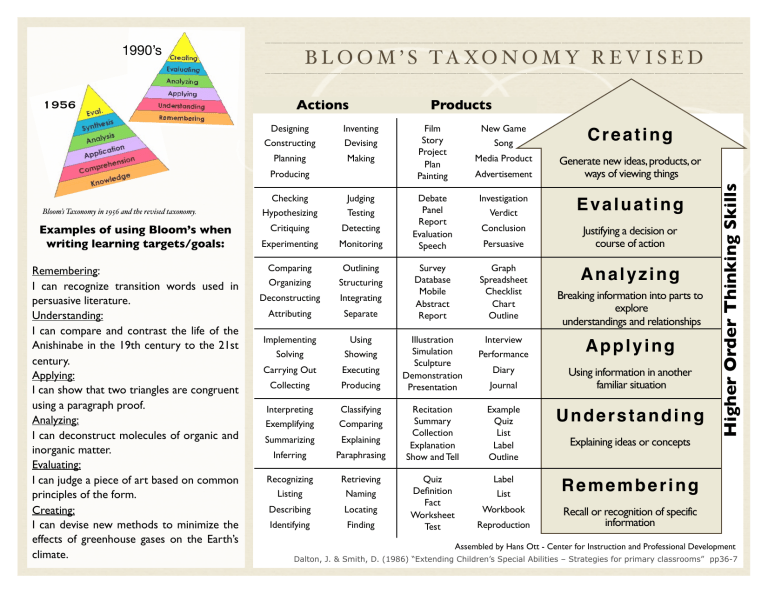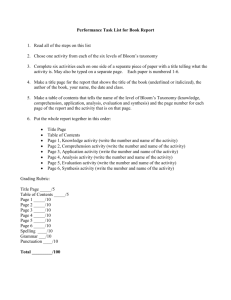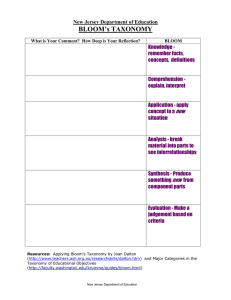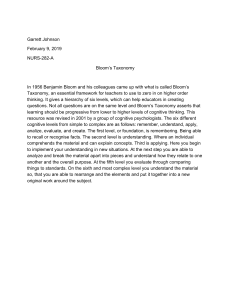Bloom's Taxonomy Explained: Learning Objectives & Cognitive Skills
advertisement

1956 B L O O M ’ S TA XO N O M Y R E V I S E D Actions Designing Constructing Inventing Devising Planning Making Producing Bloom’s Taxonomy in 1956 and the revised taxonomy. Examples of using Bloom’s when writing learning targets/goals: Remembering: I can recognize transition words used in persuasive literature. Understanding: I can compare and contrast the life of the Anishinabe in the 19th century to the 21st century. Applying: I can show that two triangles are congruent using a paragraph proof. Analyzing: I can deconstruct molecules of organic and inorganic matter. Evaluating: I can judge a piece of art based on common principles of the form. Creating: I can devise new methods to minimize the effects of greenhouse gases on the Earth’s climate. Checking Hypothesizing Judging Testing Critiquing Detecting Experimenting Monitoring Comparing Organizing Outlining Structuring Deconstructing Integrating Attributing Separate Implementing Solving Using Showing Carrying Out Executing Collecting Producing Interpreting Exemplifying Classifying Comparing Summarizing Explaining Inferring Paraphrasing Recognizing Listing Retrieving Naming Describing Locating Identifying Finding Products Film Story Project Plan Painting New Game Song Creating Media Product Advertisement Generate new ideas, products, or ways of viewing things Debate Panel Report Evaluation Speech Investigation Verdict Evaluating Conclusion Justifying a decision or course of action Survey Database Mobile Abstract Report Graph Spreadsheet Checklist Chart Outline Illustration Simulation Sculpture Demonstration Presentation Interview Performance Applying Diary Using information in another familiar situation Recitation Summary Collection Explanation Show and Tell Example Quiz List Label Outline Understanding Quiz Definition Fact Worksheet Test Label List Remembering Workbook Recall or recognition of specific information Persuasive Journal Reproduction Analyzing Breaking information into parts to explore understandings and relationships Explaining ideas or concepts Higher Order Thinking Skills 1990’s Assembled by Hans Ott - Center for Instruction and Professional Development Dalton, J. & Smith, D. (1986) “Extending Children’s Special Abilities – Strategies for primary classrooms” pp36-7 Active/Passive Learning and Bloom’s Taxonomy Can be achieved through Active or Passive Learning Knowing define repeat record list recall name relate underline Understanding translate restate discuss describe recognize explain express identify locate report review Can only be achieved through Active Learning Applying interpret apply use demonstrate dramatize practice illustrate operate schedule sketch Analyzing distinguish analyze differentiate calculate experiment compare contrast criticize inspect debate question solve examine categorize Active Learning: The Approach to Learning Well! Synthesizing compose plan propose design formulate assemble construct create organize manage prepare Evaluating judge evaluate rate compare revise assess estimate https://www.youtube.com/watch?v=dwxmPrBdIcQ B L O O M ’ S 1 9 5 6 TA XO N O M Y 1990’s Benjamin Bloom created a taxonomy of measurable verbs to help us describe and classify observable knowledge, skills, attitudes, behaviors and abilities. The theory is based upon the idea that there are levels of observable actions that indicate something is happening in the brain (cognitive activity.) By creating learning objectives using measurable verbs, you indicate explicitly what the student must do in order to demonstrate learning. 1956 http://www.llcc.edu/celt/FacultyDevelopment/Handouts/tabid/3938/Default.aspx Bloom’s Taxonomy in 1956 and the revised taxonomy. Bloom’s Taxonomy and the revision by Lorin Anderson (a former student of Bloom’s) addresses the cognitive domain of learning. The value of the this work, in part, lies in writing learning goals, objectives or targets that address what it is the student will be able to do. Using the appropriate verb in a learning target clarifies the order of thinking the student is expected to obtain. Additionally, certain products are better associated with each category. Assembled by Hans Ott - Center for Instruction and Professional Development http://cmsmediaspot.wiki.hempfieldsd.org/file/view/4teachbloomcirc.gif/177908523/4teachbloomcirc.gif


